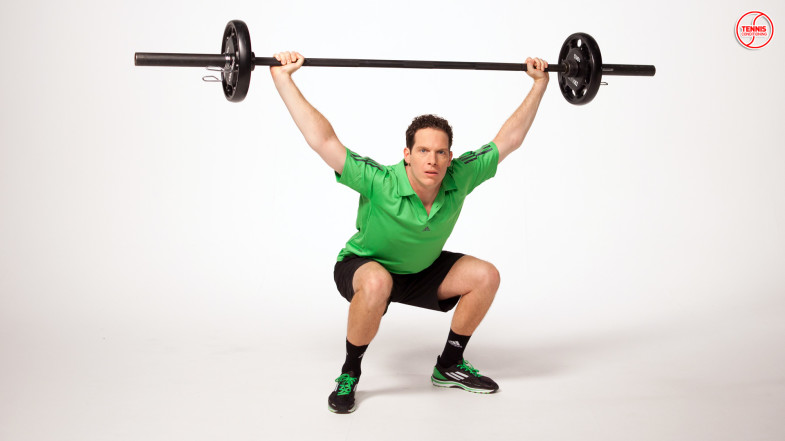If you want to gain muscle mass then you must workout vigorously while eating right. Learn more about nutrition and check out our sample hypertrophy training program.
In general, athletes need to eat foods that supply them with enough energy and nutrients so that they have the capacity to perform effectively.
Gaining 1 lb/week of muscle mass is reasonable but requires an efficient hypertrophy workout program in conjunction with a well-balanced diet that supplies a caloric surplus.
In other words, proper nutrition must supplement a hypertrophy workout program in order to get bigger and stronger.
You can use the provided information below to gain muscle mass effectively. The videos will show you how to perform these tennis conditioning exercises safely with good form.
How Much Muscle Mass Can I Gain?

Even if you follow the best hypertrophy program with the help of the best personal trainer, without proper nutrition you would not be able to gain a lot of muscle mass because it takes extra calories to gain weight, just like it takes a caloric deficit to lose weight.
Therefore it makes sense to know how many calories you should be consuming per day in total and how much should be consumed in the form of carbs, protein and fat. Don’t worry, I’ll show you later in this article how you can calculate your daily protein needs.
I know there are many websites and supplements out there that claim you can get huge in no time, and maybe some folks can, but a reasonable amount of muscle mass (not weight gain) that you could attain on a hypertrophy program is approximately 1 lb/week without any pharmaceutical (e.g. steroids) intervention.
When To Ingest Foods for Muscle Mass Gains?
In order to achieve this, you need to consume additional calories per day on top of your normal daily energy needs, while participating in hypertrophy training.
If you want to optimize the whole process of gaining muscle mass then you should also pay attention to when you are ingesting your foods because you want to ensure that the body has the necessary building blocks available to synthesize muscle tissue when needed.
Generally, a time window of 30 minutes after you finished your resistance training is recommended.
When does muscle mass growth occur?
From a thermodynamic standpoint, it is almost impossible to gain muscle mass while losing weight because you lose weight via a caloric deficit and you gain weight when there is caloric surplus.
According to available research, achieving both simultaneously, meaning gaining muscle mass while losing weight, is extremely difficult and ineffective!
As previously mentioned muscle growth only occurs when nutrition and proper hypertrophy training work together as a unit and when the nutrient ingestion occurs within 30 minutes following the workout.
For example, just by eating more protein without exercise will not increase muscle mass. Instead the extra calories are stored as fat because the body has no use for the additional protein and rather stores the energy for later use.
Find out why high protein diets can impair your performance.
The same holds true vice versa: proper hypertrophy training without adequate nutrition will not increase lean muscle mass. That’s why professional body builders train in 2 phases:
- In phase 1 they try to bulk up and become bigger by gaining muscle mass and weight
- In phase 2 they try to slim down by creating a caloric deficit to get rid of the fat
How many calories do you need to gain muscle mass?
One can estimate how many calories are necessary to gain muscle mass while committing to a hypertrophy training but any dietary recommendations must come from a registered dietitian (not your doctor or coach) because they are the only ones who can legally prescribe nutrition!
The American Dietetic Association helps you to find a registered dietitian in your neighborhood.
The exact amount of calories depends on the athlete’s:
- age
- gender
- height
- weight
According to dietary guidelines, one needs to consume 1.7 g/kg (body weight) of protein daily while committing to a hypertrophy workout program in order to maximize gains in muscle mass.
Since 1g of protein yields approximately 4 kcal simply multiply grams of protein x 4 kcal/g in order to get the required amount of calories for protein intake.
Because it can be challenging and expensive to eat the required amount of protein daily (e.g. 170g / 680kcal), protein supplements such as bars or powders can be used to supplement protein intake from natural food sources:
Example
- Divide 220lb by 2.2 to get kilogram (kg) –> 220lb/2.2 = 100kg
- Multiply 100kg by 1.7 g/kg protein –> 100kg x 1.7 g/kg = 170 g of protein
- Multiply 170 g of protein by 4 kcal/g to get total amount of calories –> 170g x 4kcal/g = 680 kcal of protein daily
Sample Hypertrophy Program
|
Exercise |
Sets |
Reps |
Intensity (1RM) |
Rest (sec) |
|
Traditional Deadlift |
3 |
10 |
70% * |
90 |
|
Front Squat |
3 |
8 |
70% * |
90 |
|
Lateral Lunges |
3 |
4 (per leg) |
70% * |
90 |
|
Romanian Deadlift |
3 |
12 |
70% * |
90 |
|
Russian Lean |
3 |
12 |
body weight |
60 |
|
Ball Leg Curls |
3 |
12 |
body weight |
60 |
* You can calculate your personal 1 repetition maximum (1RM). If you don’t know the (1RM) then use weight so that you feel a burn for the last 2 reps per set.
Related Sports Nutrition Articles
- How Sports Nutrition Can Impact Your Performance
- Losing Weight: How To Do It & Get In Shape
- Introducing Carbohydrates
Training Zone
In this section we provide you with some training tips you may be interested in to optimize your training:






